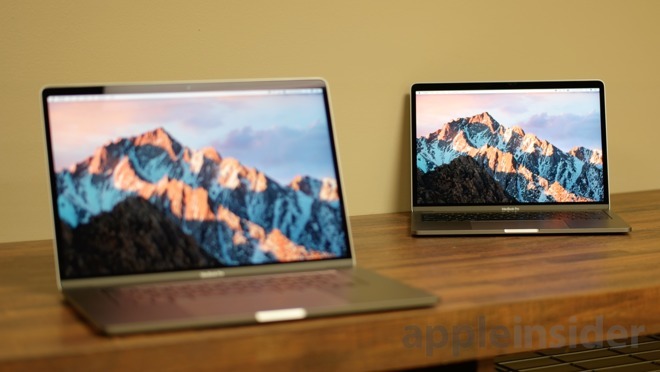Battery tests conducted by Consumer Reports showing inconsistent uptime with Apple's new MacBook Pro were inaccurate, Apple said on Tuesday, explaining that the publication had enabled a hidden setting in its Safari browser.
In a statement issued to AppleInsider, Apple said it worked with Consumer Reports over the holidays, and determined that its testing methods for the new MacBook Pro were flawed. The company had initially announced just before Christmas that it was cooperating with Consumer Reports to determine what went wrong with the MacBook Pro units they tested.
Apple says battery inconsistency was caused by a hidden Safari setting for developers which turns off the browser cache. The setting is not used by customers.
"We learned that when testing battery life on Mac notebooks, Consumer Reports uses a hidden Safari setting for developing web sites which turns off the browser cache," Apple's statement reads. "This is not a setting used by customers and does not reflect real-world usage. Their use of this developer setting also triggered an obscure and intermittent bug reloading icons which created inconsistent results in their lab.
"After we asked Consumer Reports to run the same test using normal user settings, they told us their MacBook Pro systems consistently delivered the expected battery life. We have also fixed the bug uncovered in this test. This is the best pro notebook we've ever made, we respect Consumer Reports and we're glad they decided to revisit their findings on the MacBook Pro."
The Safari fix is available to beta testers, presumably in the latest pre-release build of macOS 10.12.3, made available to registered developers on Tuesday. Apple says the full fix will be provided to the public in an upcoming macOS update.
Previous testing by the publication led Consumer Reports to not recommend any new MacBook Pro model due to battery life concerns. Their in-house testing revealed wild fluctuations in unplugged operating survivability, in some cases ranging from 16 hours to as little as 3.75 hours.
In its initial findings, the publication left the door open for an Apple response, noting the battery life of many modern products are "influenced" by software updates.
"If Apple updates its software in a way that the company claims will substantively change battery performance, we will conduct fresh tests," the original report said.
 Neil Hughes
Neil Hughes







-m.jpg)






 Charles Martin
Charles Martin
 Christine McKee
Christine McKee
 Wesley Hilliard
Wesley Hilliard
 Malcolm Owen
Malcolm Owen
 Andrew Orr
Andrew Orr
 William Gallagher
William Gallagher
 Sponsored Content
Sponsored Content







118 Comments
So CR turned off the browser cache...d'oh!
Ouch, a lot of bad press for having changed the settings. I'm wondering if CR will say it was their mistake or Apple's?
This basically invalidates anything Consumer Reports does, test, or publishes in the future. Possibly in the past too. They knowingly changed settings that would not reflect an actual user's configuration, and deceitfully posted fraudulent results.
If that's how they operate I have no interest in any other opinion they have to offer on any product.
I would guess that Consumer Reports did this knowingly. Their subscription base has likely declined as internet reviews of products are more immediate.
Any chance to find something 'bad' about Apple really must be irresistible to them. I canceled my subscription many years ago, knowing that they are not the objective source they used to be.
Why the hell would CR mess with any settings? Just take the damn thing out of the box and test it as is. I don't trust CR anyways. I'm sure they'll cover their ass and just blame it on Apple. I've always said these issues are most likely software issues with the battery. I seriously doubt Apple would release a laptop thats very well noted for its battery life with something else that gets half or worse the amount of battery life. Apple is one of the few you can actually rely on for accurate battery life.